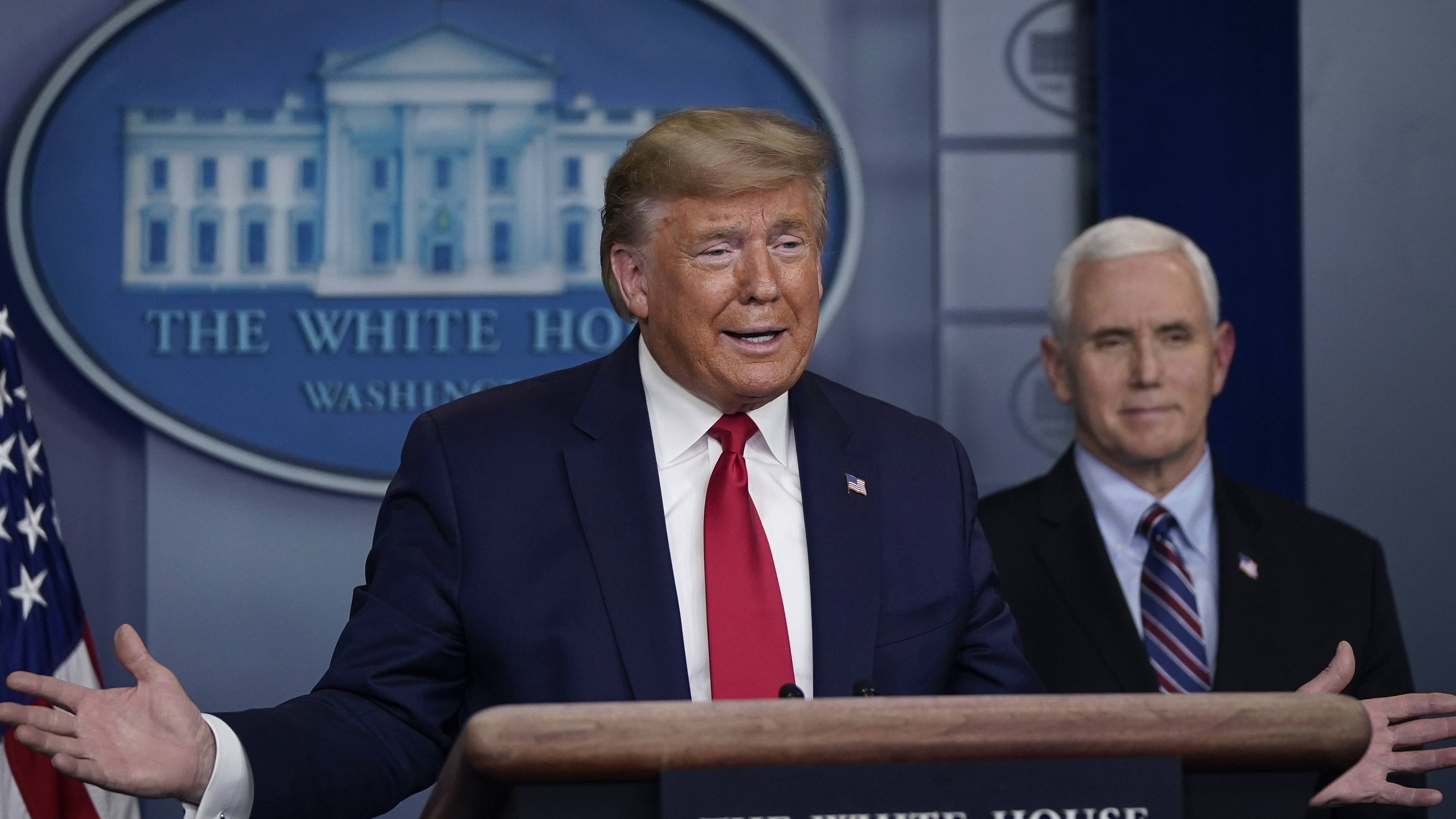Why are US voters backing Donald Trump over coronavirus?
President’s approval ratings soaring despite botched attempt to stem the pandemic

A free daily email with the biggest news stories of the day – and the best features from TheWeek.com
You are now subscribed
Your newsletter sign-up was successful
Donald Trump’s approval ratings have soared in recent weeks despite widespread criticism of his handling of the coronavirus pandemic, a series of new polls have found.
Gallup polling shows 60% of Americans approve of the president’s handling of the crisis versus 34% who disapprove, with another poll from Ipsos revealing a narrower but still positive margin.
Trump’s overall approval ratings have also seen an uptick in the last two weeks with FiveThirtyEight’s tracker rising 2 points and Gallup up to 49%, the highest of his presidency.
The Week
Escape your echo chamber. Get the facts behind the news, plus analysis from multiple perspectives.

Sign up for The Week's Free Newsletters
From our morning news briefing to a weekly Good News Newsletter, get the best of The Week delivered directly to your inbox.
From our morning news briefing to a weekly Good News Newsletter, get the best of The Week delivered directly to your inbox.
“The numbers have proved head-scratching for the president’s critics and political opponents who have castigated his handling of the pandemic and loose rhetoric,” reports The Daily Telegraph.
America is fast emerging as a battlefront against the virus, due in large part say Trump’s critics to his slow response to the crisis. The number of cases now exceeds 70,000, while US stock markets have plummeted and unemployment surges as the economy goes into lockdown.
Yet still support for the president grows.
–––––––––––––––––––––––––––––––For a round-up of the most important stories from around the world - and a concise, refreshing and balanced take on the week’s news agenda - try The Week magazine. Start your trial subscription today –––––––––––––––––––––––––––––––
A free daily email with the biggest news stories of the day – and the best features from TheWeek.com
Speaking to psephologists “well versed in the numbers and Republican political insiders who know Trump”, The Telegraph says the explanation behind the emerging pattern in the polls “is a combination of historic trends, changes in behaviour, clever use of the media and a frightened nation”.
Gallup says “historically, presidential job approval has increased when the nation is under threat” citing Franklin D. Roosevelt after Pearl Harbour and George W. Bush after 9/11.
“During these rallies, independents and supporters of the opposing party to the president typically show heightened support for the commander in chief,” the polling firm adds.
“Yet, Trump hasn’t behaved like a traditional president in a crisis moment. At times, he’s acted more like our national id, telling Americans what they may want to hear, even if those claims are false or are considered downright dangerous by public health experts,” says political reporter Lisa Lerer in the New York Times.
Whether he is able to stick to his promise to have America back up and open for business by Easter “may not matter, at least not politically” Lerer adds. “The polling shows that despite Trump’s dubious comments, Americans blame the virus rather than the president for our current situation. At least, for now.”
CNN says “the average person seems to broadly believe that Trump is doing the best that he can in a very difficult circumstance. And that what he says on a daily basis matters less than the fact he is out there saying it, and assuring the country that this will all be over soon”.
Despite the mini surge, Larry Sabato, the director of the University of Virginia's Center for Politics, told USA Today that the rally is actually deceptive and “extraordinarily weak compared to other modern presidents”.
“Incredibly, Trump still hasn’t crossed the 50% mark in job approval – a much more important measure than public views about Trump’s handling of the pandemic. Why is that? Americans either love Trump or hate Trump, and the vast majority will never change their evaluation.”
With America split down the middle, the outcome in November’s presidential election depends in large part on how long the coronavirus lockdown lasts and whether the economy, the strength of which the president has made “his political calling card”, according to the BBC, rebounds in time.
“As his popularity is mostly a function of his office, the president can afford to sit tight, defer to public health wisdom and savour the free media coverage until November. At worst, he would be following the course of almost every other world leader,” says Janan Ganesh in the Financial Times.
“Instead, he seems set on the most extraordinary gamble with his electoral prospects, and the health of his nation,” Ganesh adds.
-
 Local elections 2026: where are they and who is expected to win?
Local elections 2026: where are they and who is expected to win?The Explainer Labour is braced for heavy losses and U-turn on postponing some council elections hasn’t helped the party’s prospects
-
 6 of the world’s most accessible destinations
6 of the world’s most accessible destinationsThe Week Recommends Experience all of Berlin, Singapore and Sydney
-
 How the FCC’s ‘equal time’ rule works
How the FCC’s ‘equal time’ rule worksIn the Spotlight The law is at the heart of the Colbert-CBS conflict
-
 A Nipah virus outbreak in India has brought back Covid-era surveillance
A Nipah virus outbreak in India has brought back Covid-era surveillanceUnder the radar The disease can spread through animals and humans
-
 The stalled fight against HIV
The stalled fight against HIVThe Explainer Scientific advances offer hopes of a cure but ‘devastating’ foreign aid cuts leave countries battling Aids without funds
-
 Obesity drugs: Will Trump’s plan lower costs?
Obesity drugs: Will Trump’s plan lower costs?Feature Even $149 a month, the advertised price for a starting dose of a still-in-development GLP-1 pill on TrumpRx, will be too big a burden for the many Americans ‘struggling to afford groceries’
-
 Covid-19 mRNA vaccines could help fight cancer
Covid-19 mRNA vaccines could help fight cancerUnder the radar They boost the immune system
-
 Can TrumpRx really lower drug prices?
Can TrumpRx really lower drug prices?Today’s Big Question Pfizer’s deal with Trump sent drugmaker stocks higher
-
 The new Stratus Covid strain – and why it’s on the rise
The new Stratus Covid strain – and why it’s on the riseThe Explainer ‘No evidence’ new variant is more dangerous or that vaccines won’t work against it, say UK health experts
-
 Why are autism rates increasing?
Why are autism rates increasing?The Explainer Medical experts condemn Trump administration’s claim that paracetamol during pregnancy is linked to rising rates of neurodevelopmental disorder in US and UK
-
 RFK Jr. vaccine panel advises restricting MMRV shot
RFK Jr. vaccine panel advises restricting MMRV shotSpeed Read The committee voted to restrict access to a childhood vaccine against chickenpox